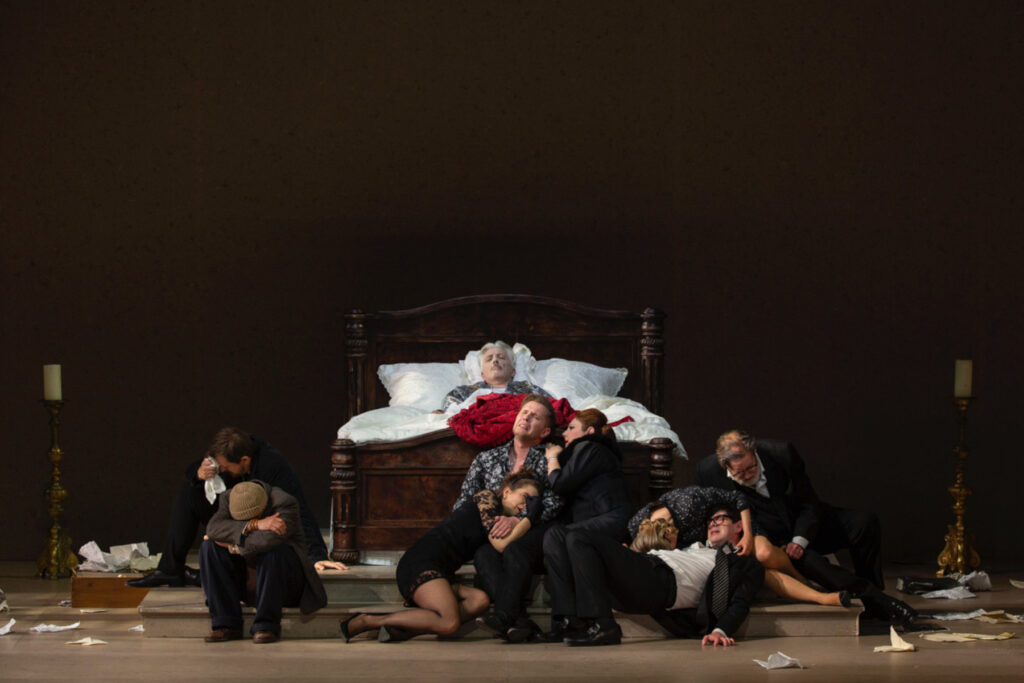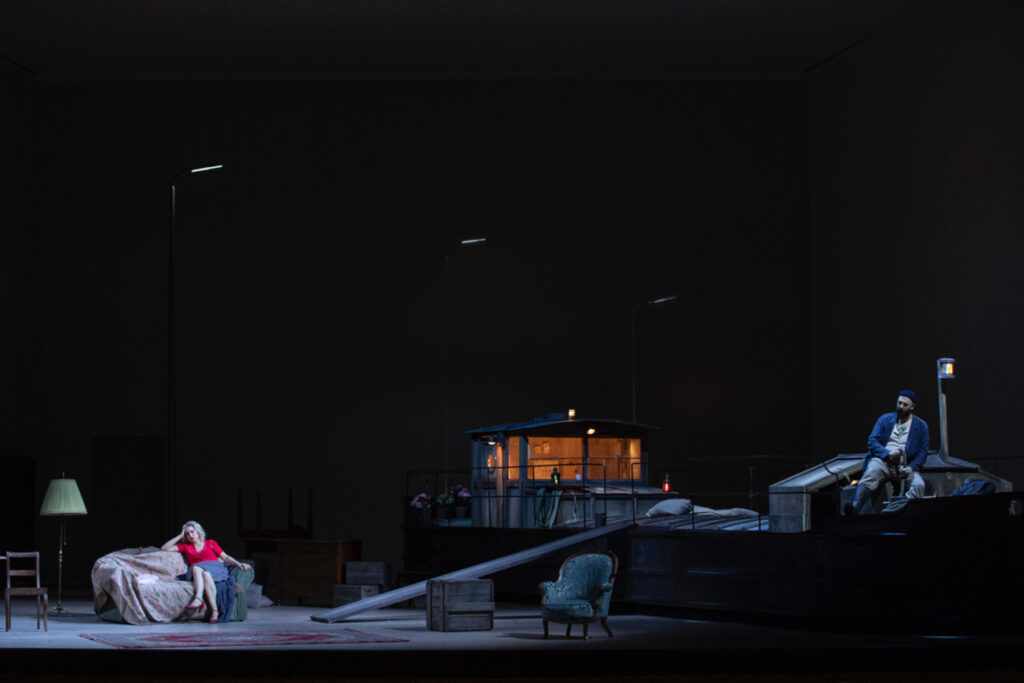There are certain stagings when good fortune shines on casting decisions and produces an operatic miracle. Such is the case with this new production of Puccini’s Il Trittico given at Opéra Bastille, which benefits from an international team in the shape of Lithuanian soprano Asmik Grigorian, Italian conductor Carlo Rizzi and German stage director Christof Loy. Together, they have shaped a truly memorable trio of performances.
Until relatively recently Il Trittico (1913-1918) was seldom performed as a triptych, its rarity largely owing to its length (nearly four hours with 2 intervals), as well as demands on casting and rehearsal. Puccini was adamant that his three one act operas should be performed together, and in the last two years his wishes have been fulfilled with co-productions from Scottish Opera and Welsh National Opera (both directed by David McVicar) and a staging from Dutch National Opera under the guiding hand of Barry Kosky. In 2010 Luca Ronconi directed the triptych at Opéra Bastille, and this new production is under the supervision of no less internationally renowned Christof Loy.
What’s strikingly different about his staging is the order of events. Rather than begin conventionally with Il Tabarro, Loy frames it with Gianni Schicchi, as a starter, and ends with the tragedy Suor Angelica. According to the programme book he envisages the triptych as a journey parallelling the chronology of the three portions of Dante’s Divine Comedy: Hell, Purgatory and Paradise. The first portion or cantica, he comments, “is called forth through the character of Buso Donati and a form of macabre a Machiavellianism, Purgatory is echoed in the sentimental wanderings and repentance of the pair of boatmen, and Paradise echoes the forgiveness and mystical transcendence accorded to Suor Angelica”.

It may not be what Puccini imagined, but from a dramatic viewpoint this arrangement works brilliantly and creates an emotional crescendo. Not least is the fact that a single soprano, Asmik Grigorian, takes on three successive roles (Lauretta, Georgetta and Sister Angelica) and brings accumulating tension, building towards the finale of Suor Angelica with an intensity that leaves no one in any doubt of her stamina and versatility. And let’s not forget the sheer beauty of sound. Little wonder there was a standing ovation on the evening I attended.
In the light of Loy’s vision of the work, maybe future productions of Il Trittico could follow the same path. Whichever order is chosen, one can still appreciate the connections between the works. Common to each is a narrative of unfulfilled dreams and the concealment of death: Gianni Schicchi centreson the cover up of a dead relative, Il tabarro ends with a crime of passion (hidden under a cloak), while Suor Anglica concerns a nun’s dreams ofa son given up and her hopes to be reunited with him in the afterlife.
For Gianni Schicchi and Suor Anglica, Loy and set designer Etienne Pluss opt for a minimalist approach, furnishing the comedy with a single bed, a row of chairs and a huge casement window, the contemporary-looking space complemented by modern day costumes provided by Barbara Drosihn. Economy is taken a step further in Suor Anglica, with little to suggest we’re in a convent except for the nun’s habits. Not even an ikon of the Virgin Mary or a crucifix adorn the cheerless walls, and a tiny ‘garden’ of potted plants does for the apothecary, while plain tables provide work surfaces for the nuns’ daily tasks. Austerity is everywhere in this anywhere place. Only in Il tabarro does the stage fill, its space dividedbetween Michele’s quayside barge and an array of furniture indicating the domestic dreams of his wife Georgetta whose affair with stevedore Luigi (Joshua Guerrero) ultimately leads to his murder. Fabrice Kebour’s shadows and silhouettes and Puccini’s sublime score bring their own foreboding and mirrors the languor of the bargemen.

And the singing? Asmik Grigorian takes the palm across the entire evening, delivering a pure toned ‘O Mio Babbino caro’ (Gianni Schicchi), melting lyricism in ‘Erano sere come queste’ when recalling her past happiness (Il Tabarro) and moistening every eye in the house as the humble, repentant Sister Angelica, whose ‘Senza mamma, o bimbo’ tears at the heart. Her top C closing ‘La grazia è discesa’ will linger long in the memory. Minor roles are well observed, with a rich-voiced and imperious Karita Mattila as Angelica’s forbidding aunt.
Earlier, Misha Kiria is a perfect fit as the opportunistic Schicchi, his sly humour and mahogany-tinged baritone amply communicated and rising above the orchestra with ease. In this respect Alexy Neklyudov’s Rinuccio doesn’t quite have the decibels, fortunately not an issue with Enkelejda Shkoza’s bustling Zita or Matteo Pierone’s naive Maestro Spinelloccio. And from the remaining cast there’s no shortage of slick routines whether looking for Buoso’s missing Will or attempting to seduce Schicchi.
Elsewhere, Roman Burdenko is every inch the world-weary cuckold Michele, his sense of resignation looms over his barge workers. But there’s an appealing warmth to his singing which draws our sympathy, sharper tones emerging only as he discovers his wife’s betrayal. Enkelejda Shkoza returns as a spirited Frugola, bringing light relief when singing of her cat Ali Baba. Joshua Guerrero makes a persuasive Luigi, impassioned in his bittersweet song about fate, ‘Hai ben vagionne’, while Scott Wilde draws the ear and eye as Talpa with his merry drinking song, and Andrea Giovanni’s Tinca makes the most of his cameo role.
In the pit Carlo Rizzi ensures keenly responsive playing with well-judged tempi and creates thoroughly involving accounts, with the Orchestre de l’Opéra national de Paris playing with undeniable affection. All in all, these were sovereign performances.
David Truslove
Il Trittico
Music by Giacomo Puccini
Libretti – Guiseppe Adami (Il tabarro) & Giovacchino Forzano (Suor Angelica & Gianni Schicchi)
Gianni Schicchi: Gianni Schicchi – Misha Kiria; Lauretta – Asmik Grigorian; Zita – Enkelejda Shkoza; Rinuccio – Alexy Neklyudov; Gherardo – Dean Power; Nella – Lavinia Bini; Betto – Manel Esteve Madrid; Simone – Scott Wilde; Marco – lurii Samoilov; La Ciesca – Theresa Kronthaler; Gherardino – Wojtek Gierlach; Maestro Spinelloccio – Matteo Pierone; Amantio di Nicolao – Alejandro Baliñas Vieites; Pinellino – Vartan Gabrielian; Gucio – Luis-Felipe Sousa
Il tabarro: Georgetta – Asmik Grigorian; Michele – Roman Burdenko; Luigi – Joshua Guerrero; Tinca – Andrea Giovanni; Talpa – Scott Wilde; Frugola – Enkelejda Shkoza; Song Seller – Dean Power; Un amante – Ilanah Lobel-Torres
Suor Angelica: Sister Angelica – Asmik Grigorian; The Princess – Karita Mattila; The Abbess – Hannah Schwarz; Sister Genovieffa – Margarita Polonskaya; Mistress of Novices – Theresa Kronthaler; Novice – Lisa Chaïb-Auriol; The Sister Monitor – Enkelejda Shkoza; Sister Osmina – Ilanah Lobel-Torres; Sister Dolcina – Lucia Tumminelli; Infirmary Sister – Maria Warenberg.
Director – Christof Loy; Set Designer – Etienne Pluss; Costumes – Barbara Drosihn; Lighting – Fabrice Kebour; Orchestre de l’Opéra national de Paris; Conductor – Carlo Rizzi
Opéra Bastille, Paris: 6 May 2025
Top image: Scene from Suor Angelica.
All photos © Guergana Damianova